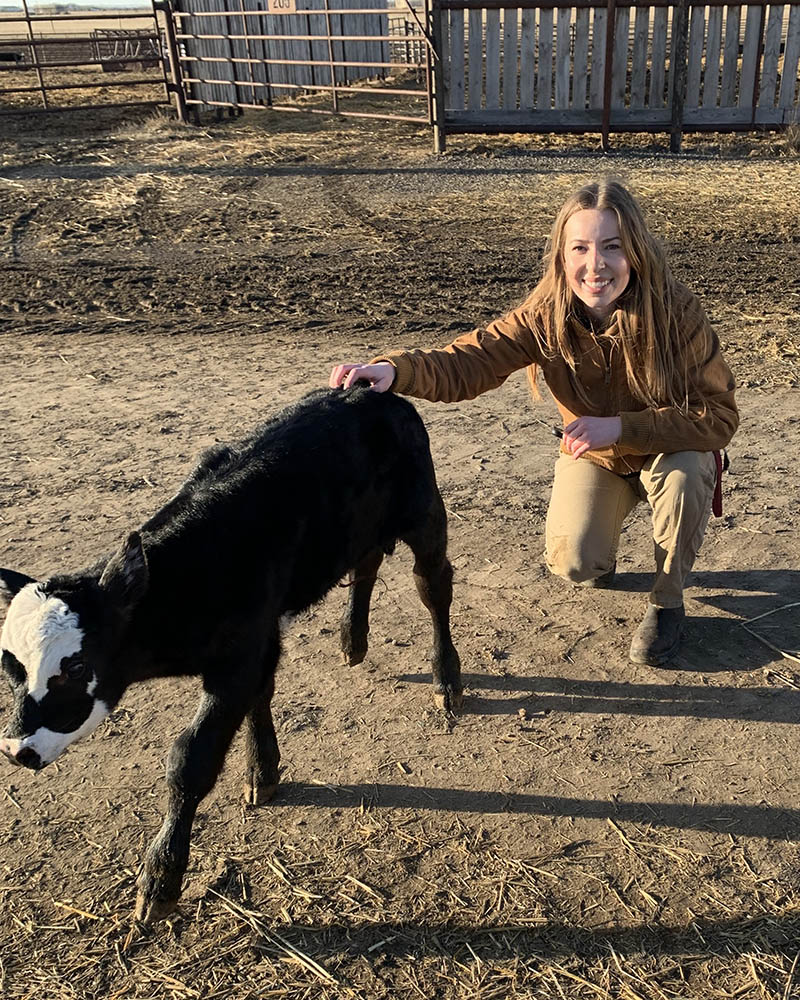Source: University of Saskatchewan, Brooke Kleiboer
Instead of having discarded canola go to waste, University of Saskatchewan (USask) graduate student Erika Cornand is leading an investigation into if these leftovers can be used as a diet supplement for pregnant cows to improve their health and the health of their calves.
When packaged into a pellet form, canola seeds can be used as a fat supplement easily provided to cows in their diets. Cornand is determining if providing this canola seed-based pellet can improve the body condition and reproduction rates of cattle, and at what amounts this supplement is effective.
Cornand, a master’s student in Animal and Poultry Science in the College of Agriculture and Bioresources, and her researcher supervisor Dr. Bart Lardner (PhD) are using the innovative research facilities located at the USask Livestock and Forage Excellence Centre (LFCE) in Clavet, Sask. The pastures and feeding facilities available at the LFCE have allowed the research team to monitor 72 cows during the past two years during their pregnancies.
Three groups of cattle were randomly chosen to receive differing amounts of the canola supplement at the same stage in their pregnancies. One group received no extra fat supplement, while the other two groups received 150 and 300 grams of fat per day, respectively. Body weight of the cows and the quality and volume of milk produced after calving was recorded throughout the study to track the effects of the additional fat supplement.
“Cattle can typically be fed three to eight per cent fat in their total diet before any negative effects are commonly reported,” said Cornand. “We’re looking to determine if positive effects on cow and calf performance seen in previous research can be replicated here, and to determine if there is a specific level where the benefits [of a supplement] are maximized.”
The cattle received the trial canola-based supplement for 150 days before being transitioned back to a regular diet.
“Our preliminary results suggest that providing the canola seed-based pellet during the second and third trimesters of pregnancy improved their body condition scores and the pregnancy rate of the cows,” said Cornand.

She notes that the preliminary results of the study are good news for both beef producers with cattle to raise and grain farmers who may have canola to discard.
“Rather than off-grade canola being sold at discounted rates, there is the possibility for grain producers to sell their product to cattle producers,” said Cornand. “There are potential benefits for the cow and her offspring which may carry over into economic profitability.”
The study is also planning to examine how the additional fat in the mother’s diet may cause genetic differences in her offspring.
“We are wrapping up the second year of data collection for the cow portion of this study,” said Cornand, noting that the project will now move into a phase where calves are weaned from their mothers and raised in feedlots at the LFCE according to industry guidelines. “We’ve collected additional data from all calves born [during the study period] that will be analyzed for genetic differences due to prenatal fat supplementation.”
Cornand is on track to finish her master’s degree by December 2023, but the study will continue on with the calf portion of the trial and a genetic analysis to follow in the next few years. So far, Cornand has been invited to present her preliminary research results at the American Society of Animal Science Conference and the Canadian Beef Industry Conference, with final results to be complete in 2026.
With previous experience working as a dairy technician and during her undergraduate studies at the University of Alberta, Cornand hopes her work helps beef producers leverage the findings of research that is ongoing to make their herds healthier.
“I want to be able to make a difference to the producer – whether in the cow-calf, dairy, or feedlot sector – so they can realize the benefits of various nutritional investigations being carried out here at the University of Saskatchewan,” said Cornand. “Part of my training in this program is preparing me to deal with challenges that producers face and working together to investigate the causes and address them by coming up with practical solutions.”
The study has received funding support from the Saskatchewan Canola Development Commission, the Beef Cattle Research Council, Alberta Beef Producers, the Saskatchewan Cattlemen’s Association, and the Natural Sciences and Engineering Research Council of Canada.









